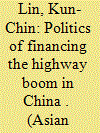|
|
|
Sort Order |
|
|
|
Items / Page
|
|
|
|
|
|
|
| Srl | Item |
| 1 |
ID:
183927


|
|
|
|
|
| Summary/Abstract |
China’s rapidly growing local government debt problem has long been recognized by foreign observers as a risk, but inside China, only recently was this problem called out as alarming. Why has local government debt been allowed to grow with little direct intervention from central authorities? We argue that it has much to do with a “grand bargain” between the central government and localities during the 1994 fiscal recentralization reform. While much scholarly attention has been paid to the consequences of the 1994 reform that left localities with a tremendous fiscal gap, our findings show that Beijing in fact gave localities the green light to create new backdoor financing institutions that counteracted the impact of fiscal recentralization. In essence, these institutions were the quid pro quo offered to localities to sustain their incentive for local state-led growth after 1994. The bargain worked, and growth continued. The drawback, however, was that China’s economic growth has been accompanied by the accumulation of local government debt with little transparency and central control. When the global financial crisis slowed growth, and local deficits and debts spiked, Beijing began to shut down backdoor financing and opened front-door options that were transparent and under the control of national authorities—but with limited success. In the wake of COVID-19, the question is whether the pendulum will swing back toward more tolerance of local debt for the sake of economic growth.
|
|
|
|
|
|
|
|
|
|
|
|
|
|
|
|
| 2 |
ID:
187908


|
|
|
|
|
| Summary/Abstract |
China's land finance system has been a key contributor to the country's “economic miracle” over recent decades. While there is much existing research on different components of the land finance system, this paper, based on both an academic literature review and data analysis, provides an integrated understanding of how these parts function in tandem around the pivotal role of profitability in the system. First, we summarize the essentials of China's land finance system by providing a framework to understand the self-reinforcing cycle between local governments' financing and spending activities based on urban land-use rights (LURs). We also quantify the magnitude of profits generated by the cycle and its contribution to China's urban development. Second, we investigate the institutional underpinnings of the system, which empower local governments as the monopoly supplier of urban LURs. We also document the rising temporal trend in land prices in most cities. Both these institutional and market factors facilitate the profitability of land finance. Finally, we shed light on the sustainability of the system. Local governments' strong incentives to maximize the profitability of land finance have resulted in increasing economic and social costs/risks. Meanwhile, the feasibility of the system increasingly is coming into question, as both ongoing institutional reforms and recent urban land market cooling raise potentially fundamental challenges to the profitability of land finance.
|
|
|
|
|
|
|
|
|
|
|
|
|
|
|
|
| 3 |
ID:
161862


|
|
|
|
|
| Summary/Abstract |
How does land institution affect economic growth? This paper proposes a simple model showing that, in an institution that land is owned and supplied by the state, local governments tend to increase investment in infrastructure when holding a larger share of land conveyance revenue in the total revenue. The main channel is that land conveyance revenue serves as a signal of credit quality of local governments. To test the model of land financing, this paper employs an exogenous event of the deregulation of local government debt in China in 2009. Using county-level data in China, empirical results suggest that counties with a higher initial share of land conveyance revenue were growing faster after 2009. The land-financing effect was persistent and even stronger during 2009 to 2014. Results are robust using geographic plainness as the instrumental variable measuring the amount of developable land resources. There is also consistent evidence on the growth of night light intensity.
|
|
|
|
|
|
|
|
|
|
|
|
|
|
|
|
| 4 |
ID:
160862


|
|
|
|
|
| Summary/Abstract |
This paper examines total factor efficiency and productivity performance by taking into account local government debt (LGD) in 31 Chinese provincial regions for the period 2000–2013. The results show that neglecting LGD may overstate economic performance in Chinese provinces. The eastern region shows better performance in single factor efficiency and total factor efficiency than the non‐eastern regions. The western region shows the worst total factor performance. The north‐eastern region is the only region that has experienced a decline in total factor performance. The state‐dominated, investment‐driven development model may help technological progress across Chinese regions but could lead to significant factor misallocation. We argue that biases towards more state‐dominated investment and land supply in less productive western, central and north‐eastern regions, at the expense of investment and land supply in more productive eastern regions, have contributed to the recent slowdown in economic growth in China. Therefore, further market‐oriented reforms in factor markets should be considered in the future.
|
|
|
|
|
|
|
|
|
|
|
|
|
|
|
|
| 5 |
ID:
160429


|
|
|
|
|
| Summary/Abstract |
Fiscal federalism has provided the institutional basis for the rapid highway boom in China for three decades, creating a close linkage between subnational investment and revenue claims on tolled roads. This model of capitalization is financially unsustainable and undermines the standardization of taxation and contracting of public–private partnership projects.
|
|
|
|
|
|
|
|
|
|
|
|
|
|
|
|
|
|
|
|
|